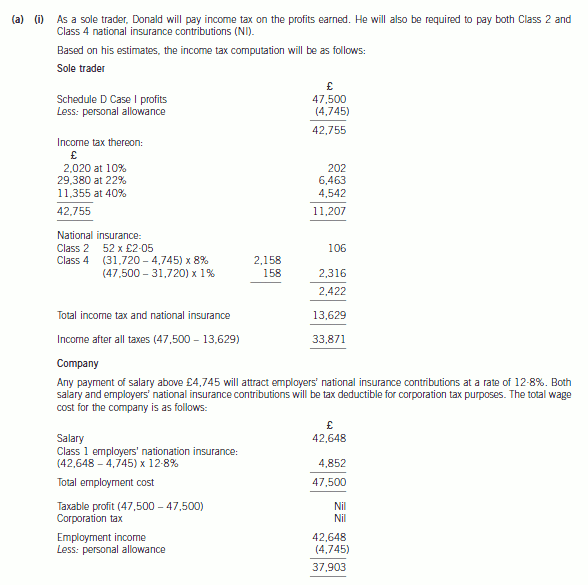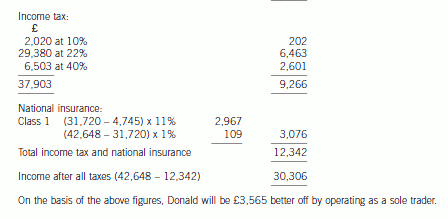ACCA考试中国区通过率高不高?快来看呀!
发布时间:2020-03-14
随着ACCA报考人数的增加,越来越多的小伙伴询问:ACCA考试通过率高不高?快跟随51题库考试学习网的脚步一起来看看吧!
在国内ACCA考试通过率还是略高于国际平均水平的,因此大家并不需要对这一问题非常困扰。
51题库考试学习网还给大家带来了ACCA考试主要注册流程:
1、准备注册所需材料。
(1)在校学生所需准备的注册材料:
中英文在校证明(原件必须为彩色扫描件),中英文成绩单(均需为加盖所在学校或学校教务部门公章的彩色扫描件),中英文个人身份证件或护照(原件必须为彩色扫描件、英文件必须为加盖所在学校或学校教务部门公章的彩色扫描件),2寸彩色护照用证件照一张,用于支付注册费用的国际双币信用卡或国际汇票。
(2)非在校学生所需准备的注册资料(符合学历要求):
中英文个人身份证件或护照(原件必须为彩色扫描件、英文件必须为加盖翻译公司翻译专用章的彩色扫描件),中英文学历证明(原件必须为彩色扫描件、英文件必须为加盖翻译公司翻译专用章的彩色扫描件,需提供中英文成绩单、国外学历均需提供成绩单),2寸彩色护照用证件照一张,用于支付注册费用的国际双币信用卡或国际汇票。
(3)非在校学生所需准备的注册资料(不符合学历要求-FIA形式):
中英文个人身份证件或护照(原件必须为彩色扫描件、英文件必须为加盖翻译公司翻译专用章或者学校教务部门公章的彩色扫描件),2寸彩色护照用证件照一张,用于支付注册费用的国际双币信用卡或国际汇票。
2、在全球官方网站进行注册:在线上传注册资料扫描文件,采用纸质材料将注册资料递交ACCA代表处。
3、支付注册费用。采用在线上传资料方式的必须在线支付。
4、查询注册进度:线上完成全部注册的约2周,纸质注册约6周。
以上即为51题库考试学习网根据ACCA考试为大家带来的相关信息,希望能对大家有一个参考作用,我是51题库考试学习网,如果小伙伴们还有其他问题的话,欢迎随时咨询。
下面小编为大家准备了 ACCA考试 的相关考题,供大家学习参考。
4 You are an audit manager in Smith & Co, a firm of Chartered Certified Accountants. You have recently been made
responsible for reviewing invoices raised to clients and for monitoring your firm’s credit control procedures. Several
matters came to light during your most recent review of client invoice files:
Norman Co, a large private company, has not paid an invoice from Smith & Co dated 5 June 2007 for work in respect
of the financial statement audit for the year ended 28 February 2007. A file note dated 30 November 2007 states
that Norman Co is suffering poor cash flows and is unable to pay the balance. This is the only piece of information
in the file you are reviewing relating to the invoice. You are aware that the final audit work for the year ended
28 February 2008, which has not yet been invoiced, is nearly complete and the audit report is due to be issued
imminently.
Wallace Co, a private company whose business is the manufacture of industrial machinery, has paid all invoices
relating to the recently completed audit planning for the year ended 31 May 2008. However, in the invoice file you
notice an invoice received by your firm from Wallace Co. The invoice is addressed to Valerie Hobson, the manager
responsible for the audit of Wallace Co. The invoice relates to the rental of an area in Wallace Co’s empty warehouse,
with the following comment handwritten on the invoice: ‘rental space being used for storage of Ms Hobson’s
speedboat for six months – she is our auditor, so only charge a nominal sum of $100’. When asked about the invoice,
Valerie Hobson said that the invoice should have been sent to her private address. You are aware that Wallace Co
sometimes uses the empty warehouse for rental income, though this is not the main trading income of the company.
In the ‘miscellaneous invoices raised’ file, an invoice dated last week has been raised to Software Supply Co, not a
client of your firm. The comment box on the invoice contains the note ‘referral fee for recommending Software Supply
Co to several audit clients regarding the supply of bespoke accounting software’.
Required:
Identify and discuss the ethical and other professional issues raised by the invoice file review, and recommend
what action, if any, Smith & Co should now take in respect of:
(a) Norman Co; (8 marks)
4 Smith & Co
(a) Norman Co
The invoice is 12 months old and it appears doubtful whether the amount outstanding is recoverable. The fact that such an
old debt is unsettled indicates poor credit control by Smith & Co. Part of good practice management is to run a profitable,
cash generating audit function. The debt should not have been left outstanding for such a long period. It seems that little has
been done to secure payment since the file note was attached to the invoice in November 2007.
There is also a significant ethical issue raised. Overdue fees are a threat to objectivity and independence. Due to Norman Co
not yet paying for the 2007 year end audit, it could be perceived that the audit has been performed for free. Alternatively the
amount outstanding could be perceived as a loan to the client, creating a self-interest threat to independence.
The audit work for the year ended 28 February 2008 should not have been carried out without some investigation into the
unpaid invoice relating to the prior year audit. This also represents a self-interest threat – if fees are not collected before the
audit report is issued, an unmodified report could be seen as enhancing the prospect of securing payment. It seems that a
check has not been made to see if the prior year fee has been paid prior to the audit commencing.
It is also concerning that the audit report for the 2008 year end is about to be issued, but no invoice has been raised relating
to the work performed. To maximise cash inflow, the audit firm should invoice the client as soon as possible for work
performed.
Norman Co appears to be suffering financial distress. In this case there is a valid commercial reason why payment has not
been made – the client simply lacks cash. While this fact does not eliminate the problems noted above, it means that the
auditors can continue so long as adequate ethical safeguards are put in place, and after the monetary significance of the
amount outstanding has been evaluated.
It should also be considered whether Norman Co’s financial situation casts any doubt over the going concern of the company.
Continued cash flow problems are certainly a financial indicator of going concern problems, and if the company does not
resolve the cash flow problem then it may be unable to continue in operational existence.
Action to be taken:
– Discuss with the audit committee (if any) or those charged with governance of Norman Co:
The ethical problems raised by the non-payment of invoices, and a payment programme to secure cash payment in
stages if necessary, rather than demanding the total amount outstanding immediately.
– Notify the ethics partner of Smith & Co of the situation – the ethics partner should evaluate the ethical threat posed by
the situation and document the decision to continue to act for Norman Co.
– The documentation should include an evaluation of the monetary significance of the amount outstanding, as it will be
more difficult to justify the continuance of the audit appointment if the amount is significant.
– The ethics partner should ensure that a firm-wide policy is communicated to all audit managers requiring them to check
the payment of previous invoices before commencing new client work. This check should be documented.
– Consider an independent partner review of the working papers prepared for the 28 February 2008 audit.
– The audit working papers on going concern should be reviewed to ensure that sufficient evidence has been gathered to
support the audit opinion. Further procedures may be found to be necessary given the continued cash flow problems.
– Smith & Co have already acted to improve credit control by making a manager responsible for reviewing invoices and
monitoring subsequent cash collection. It is important that credit control procedures are quickly put into place to prevent
similar situations arising.
6 The explosive growth of investing and raising capital in the global markets has put new emphasis on the development
of international accounting, auditing and ethical standards. The International Federation of Accountants (IFAC) has
been at the forefront of the development of the worldwide accountancy profession through its activities in ethics,
auditing and education.
Required:
Explain the developments in each of the following areas and indicate how they affect Chartered Certified
Accountants:
(a) IFAC’s ‘Code of Ethics for Professional Accountants’; (5 marks)
6 DEVELOPMENTS AND CERTIFIED CHARTERED ACCOUNTANTS
Tutorial note: The answer which follows is indicative of the range of points which might be made. Other relevant material will
be given suitable credit.
(a) IFAC’s ‘Code of Ethics for Professional Accountants’
Since its issue in 1996, IFAC’s ‘Code of Ethics for Professional Accountants’ (‘The Code’) has undergone several revisions
(1996, 1998, 2001, 2004 and 2005). IFAC holds the view that due to national differences (of culture, language, legal and
social systems) the task of preparing detailed ethical requirements is primarily that of the member bodies in each country
concerned (and that they also have the responsibility to implement and enforce such requirements).
In recognizing the responsibilities of the accountancy profession, IFAC considers its own role to be in providing guidance and
promoting harmonization. IFAC has established ‘The Code’ to provide a basis on which the ethical requirements for
professional accountants in each country should be founded.
IFAC’s conceptual approach is principles-based. It provides a route to convergence that emphasises the profession’s integrity.
This approach may be summarised as:
■ identifying and evaluating circumstances and relationships that create threats (e.g. to independence); and
■ taking appropriate action to:
– eliminate these threats; or
– reduce them to an acceptable level by the application of safeguards.
If no safeguards are available to reduce a threat to an acceptable level an assurance engagement must be refused or
discontinued.
This approach was first introduced to Section 8 of The Code, on independence, and is applicable to assurance engagements
when the assurance report is dated on or after 31 December 2004.
Further to the cases of Enron, Worldcom and Parmalat, IFAC issued a revised Code in July 2005 that applies to all professional
accountants, whether in public practice, business, industry or government2.
A member body of IFAC may not apply less stringent standards than those stated in the Code. The Code is effective from
30 June 2006.
Practicing accountants and members in business must maintain the high standards of professional ethics that are expected
by their professional bodies (such as ACCA). These developments codify current best practice in the wake of the
aforementioned recent corporate scandals.
The developments in The Code have wider application in that it:
■ applies to all assurance services (not just audit);
■ considers the standpoints of the firm and of the assurance team.
Since ACCA is a member-body of IFAC the elevation of The Code to a standard will affect all Chartered Certified Accountants.
.
For this part, assume today’s date is 15 August 2005.
5 (a) Donald is aged 22, single, and about to finish his university education. He has plans to start up a business selling
computer games, and intends to start trading on 1 April 2006, making up accounts to 31 March annually.
He believes that his business will generate cash (equal to taxable profits) of £47,500 in the first year. He
originally intended to operate as a sole trader, but he has recently discovered that as an alternative, he could
operate through a company. He has been advised that if this is the case, he can take a maximum gross salary
of £42,648 out of the company.
Required:
(i) Advise Donald on the income tax (IT), national insurance (NIC) and corporation tax (CT) liabilities he
will incur for the year ended 31 March 2007 trading under each of the two alternative business
structures (sole trade/company). Your advice should be supported by calculations of disposable income
for both alternatives assuming that in the company case, he draws the maximum salary stated.
(7 marks)


声明:本文内容由互联网用户自发贡献自行上传,本网站不拥有所有权,未作人工编辑处理,也不承担相关法律责任。如果您发现有涉嫌版权的内容,欢迎发送邮件至:contact@51tk.com 进行举报,并提供相关证据,工作人员会在5个工作日内联系你,一经查实,本站将立刻删除涉嫌侵权内容。
- 2020-01-10
- 2020-04-21
- 2020-04-14
- 2019-03-29
- 2020-05-20
- 2020-02-14
- 2020-03-11
- 2020-01-10
- 2020-04-16
- 2020-01-10
- 2020-01-10
- 2020-01-09
- 2020-01-10
- 2019-12-27
- 2020-01-10
- 2020-01-09
- 2020-05-07
- 2020-01-10
- 2020-01-10
- 2020-01-03
- 2020-02-19
- 2020-01-10
- 2020-01-10
- 2020-01-09
- 2020-01-13
- 2019-04-03
- 2020-02-08
- 2021-06-19
- 2020-04-19
- 2020-01-10